Jumby Bay Island Grill
- 561-630-2030
- email us
- Jupiter, Florida, United States
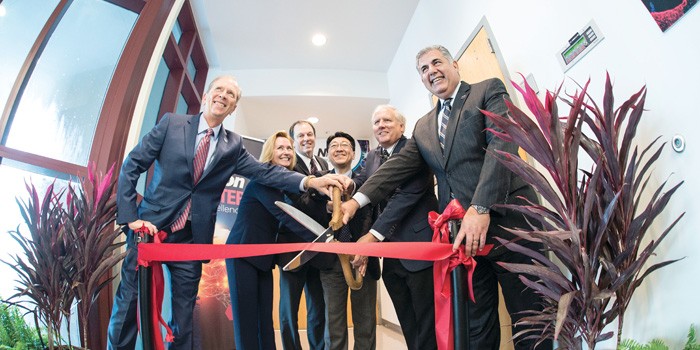
JUPITER, FL – March 3, 2017 –The study of neuroscience has but one aim behind it: To attain a greater understanding of the human mind and brain. One might boldly refer to advances in neuroscience as a natural progression of evolution and everything that it has left in its wake, helping illuminated scientists decipher and understand our past, current, and even future cognitive processes and behavioral patterns. It’s a crucial field that is deserving of the best instrumentation for those who seek to partake in these advances by immersing themselves in neuroscience as their chosen career path. Therefore, it is critically important for universities to deploy their greatest efforts to secure these instruments for students specializing in the field of neuroscience. And not just in the Ivy League sector – there are many state universities that strive to compete with some of the brightest researchers in the country, and in order to do this, high-end technology undoubtedly plays a role. Today, Florida Atlantic University’s (FAU) Brain Institute at the John D. MacArthur campus in Jupiter, Florida has made that leap.
A leap that materialized with FAU’s acquisition of Nikon high-speed, laser-based microscopes that provides 3D views of nervous systems and whole organisms. The investment in state-of-the-art microscopy equipment not only reinforced the university’s commitment to the field of neuroscience, it also helped establish a partnership with Nikon Instruments Inc. resulting in the FAU Brain Institute’s designation as a Nikon Center of Excellence (NCE). The NCE designation involves an exchange of knowledge between Nikon and FAU that gives students and researchers access to the latest optical systems in order to advance their research and exposure in the field of neuroscience, and provides Nikon with technical knowledge of advances in the field of neuroscience from these up-and-coming researchers, as well as a showcase for their cutting-edge products. Through the partnership, the FAU Brain Institute is now the first NCE in the Southeast United States, and one of seven designated centers in the United States and 17 worldwide.
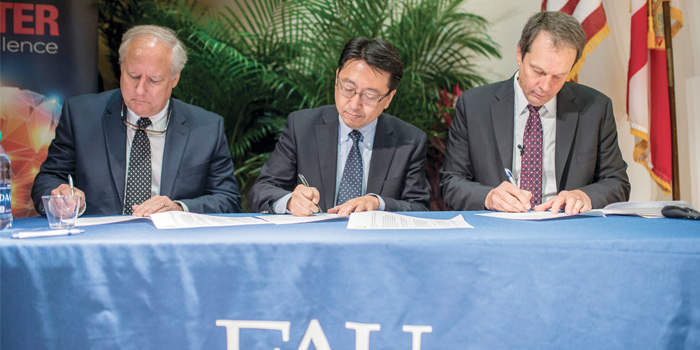
INAUGURATING EXCELLENCE
Randy Blakley, executive director of FAU’s Brain Institute, Toshiaki Nagano, president and CEO of Nikon Instruments; and FAU President John Kelly signed an agreement and cut the ribbon to officially declare the Brain Institute as a Nikon Center of Excellence.
The FAU Brain Center designation as an NCE was made official last December during a ceremony held at the Jupiter campus that highlighted the growth of FAU’s Jupiter Life Science Initiative – FAU’s plan for growing building science that laid the groundwork for the Brain Institute to take form – in where Dr. Randy D. Blakely, executive director of FAU’s Brain Institute was joined by FAU President John Kelly and Toshiaki Nagano, president and chief executive officer of Nikon Instruments Inc. Amidst the presence of over 300 community stakeholders, as well as FAU students, staff, and faculty, Blakely, Kelly, and Nagano signed a Memorandum of Understanding that recognized the campus as an NCE. InJupiter Magazine recently spoke with Dr. Blakely to discover his take on what the NCE designation means for FAU and its students.
RELATED Philanthropy Tank: Diving In
“The benefits of this agreement go hand-in-hand for both parties,” points out Blakely. “By investing in these high-end microscopes, we were able to demonstrate our commitment to Nikon, and Nikon sees the value in partnering with us by gaining access to our research and using our experience with their tools to ensure that our instruments are performing at the highest standard and gaining insights from practicing scientists to potential paths for instrumentation development.”
Blakely, a prominent and internationally renowned researcher in the field of neuroscience, was recently recruited from Vanderbilt University to spearhead the Brain Institute’s biotech ambitions for expansion. He considers that the partnership with Nikon was a critical step forward in attaining the Brain Institute’s goals. Going forward, both entities can establish joint-training programs and Nikon will provide significant discounts on different types of equipment to the institute.
But the partnership extends beyond putting the right instruments in the hands of students and reseachers, it also places FAU’s neuroscience program in the national and international spotlight with the hope that more bright minds will be inclined to pursue the next stage in their careers at The FAU Brain Institute, which is currently recruiting additional scientists to augment their research hub to continue pursuing advanced neuroscience studies with a focus on imaging brain cells to provide clues to diseases including depression, drug addiction, and autism.
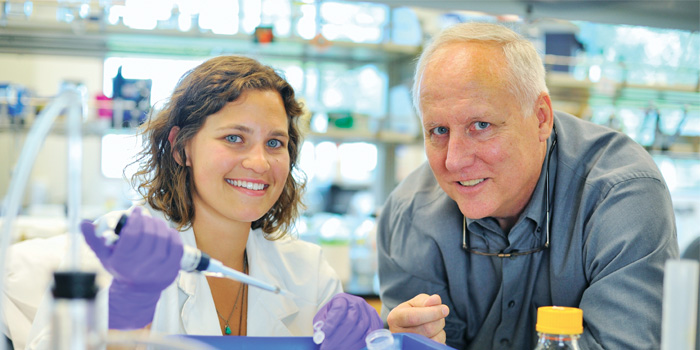 | 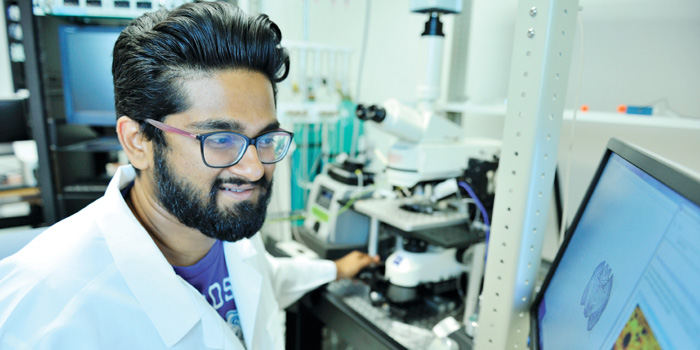 | 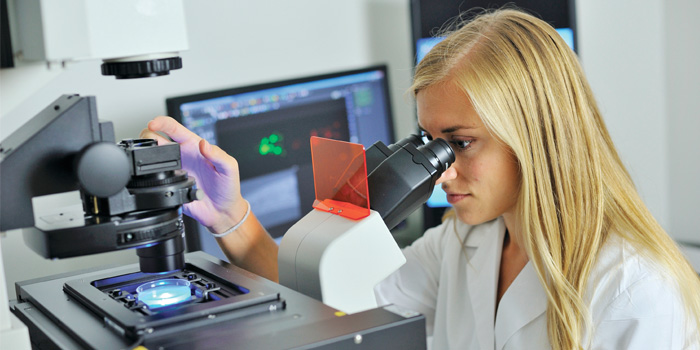 |
RESEARCHERS TODAY, NEUROSCIENTISTS TOMORROW
The NCE designation allows FAU students to work with the latest cutting-edge tools in microscopy
“It’s an investment in our community and our region,” says Blakely. “By having this partner in scientific imaging, the profile is raised for FAU. It tells our surrounding universities and institutes all around that we mean business when it comes to imaging science, and in particular, neuroscience imaging. It means a lot to me in terms of my ability to point to FAU as an outstanding home to research and we hope that it will be served as one of the many pieces of the puzzle to building this Jupiter campus into something really special. The creation and growth of this center, the accumulated equipment, the establishment of this partnership signifies to us, to our new recruits, and to our new students that we have arrived. FAU neuroscientists will be able to compete at the highest level with other neuroscientists at premier institutions around the country.”
For Blakely and the FAU Brain Institute staff, the infrastructure drives the science. While being smart is an advantage, having the proper “ammunition” is essential to excel in this field – and the NCE designation does just that for FAU – since the ammunition is the instrumentation, in this case.
“If one wants to participate in advanced research or teach neuroscience moving forward, experience with this type of technology and these kind of approaches in their training is absolutely essential in order to have a successful, independent career as a brain researcher,” notes Blakely. “This high-end technology puts us now in a position where we can say ‘Come to Jupiter and become a first class neuroscientist.’”
Looking to the future, Blakely expects continual growth of the Brain Institute and progression of their research. FAU is looking to build on the Brain Institute’s technically advanced staff, to attract new investigators to their team, and to continue to invest in resources that will bear fruit to further advancements in neuroscience. The NCE title, he claims, is merely the beginning.
“The next step will be enhanced opportunities that come with new faculty hires,” says Blakely. “It’s kind of a ‘Build it and they will come’ approach. The excitement is palpable and it’s only the beginning. We have built the infrastructure but it doesn’t stop there, we will continue building to accommodate the critical mass of students and researchers that are joining our endeavors. We are now realizing the vision that FAU had 10 to 15 years ago to create a hub for science in Jupiter – it is happening now and we couldn’t be prouder.”
For more information, please visit www.ibrain.fau.edu.
Click HERE to read the full article on InJupiter Magazine.

College or University Library
Jupiter, Florida, United States |
5617998530,
email us